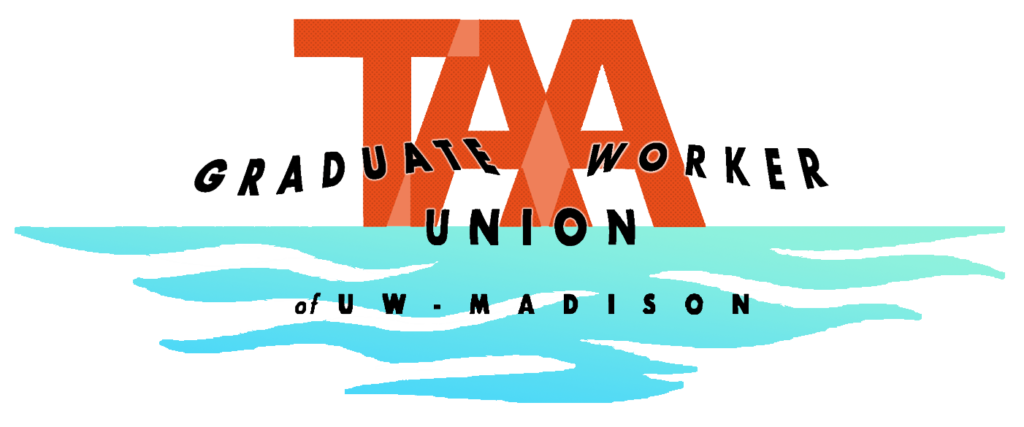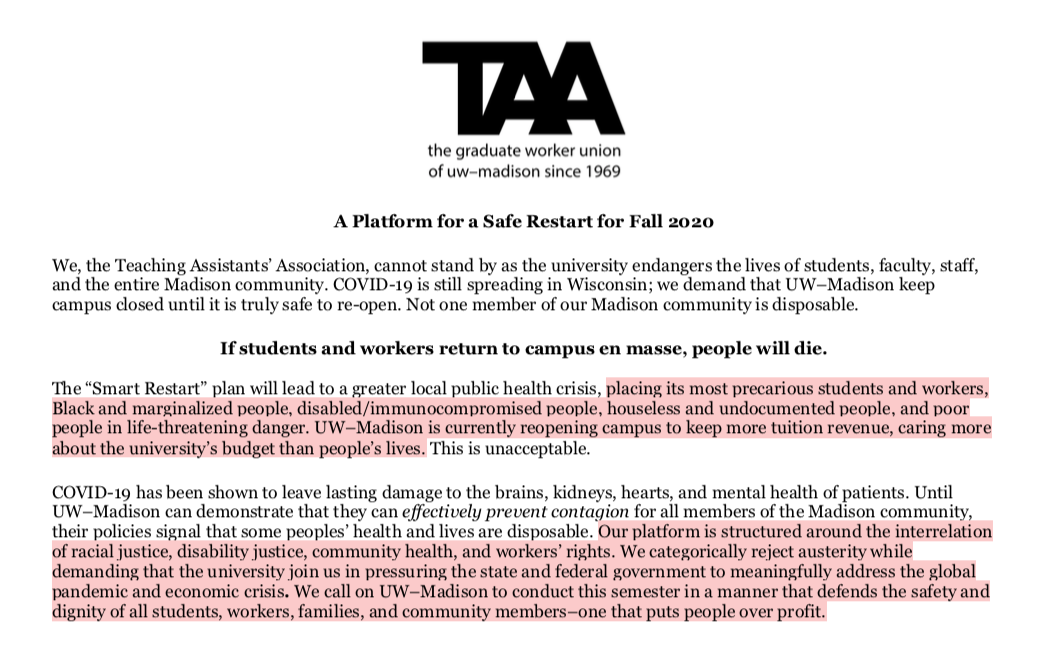TAA Platform for a Safe & Moral Restart for Fall 2020
A Safe & Moral Restart for Fall 2020
Current platform updated August 21, 2020. This page will be updated as we build this platform in coalition with other groups, unions, and organizations. A current working draft of the platform can also be found at https://bit.ly/SafeRestart
We, the Teaching Assistants’ Association, cannot stand by as the university endangers the lives of students, faculty, staff, and the entire Madison community. COVID-19 is still spreading in Wisconsin; we demand that UW–Madison keep campus closed until it is truly safe to re-open. Not one member of our Madison community is disposable.
If students and workers return to campus en masse, people will die.
The “Smart Restart” plan will lead to a greater local public health crisis, placing its most precarious students and workers, Black and marginalized people, disabled/immunocompromised people, houseless and undocumented people, and poor people in life-threatening danger. UW–Madison is currently reopening campus to keep more tuition revenue, caring more about the university’s budget than people’s lives. This is unacceptable.
COVID-19 has been shown to leave lasting damage to the brains, kidneys, hearts, and mental health of patients. Until UW–Madison can demonstrate that they can effectively prevent contagion for all members of the Madison community, their policies signal that some peoples’ health and lives are disposable. Our platform is structured around the interrelation of racial justice, disability justice, community health, and workers’ rights. We categorically reject austerity while demanding that the university join us in pressuring the state and federal government to meaningfully address the global pandemic and economic crisis. We call on UW–Madison to conduct this semester in a manner that defends the safety and dignity of all students, workers, families, and community members–one that puts people over profit.
We demand a Safe Restart for Fall 2020. UW–Madison must:
Defend Public Health:
Shift to online learning and to de-densify campus safely; provide public health resources to our entire community
- Only offer online instruction until Dane County meets the Public Health Madison & Dane County metrics for allowing in-person K12 instruction to resume. After that point and until the end of the pandemic, use online instruction as the default modality, allowing departments to offer courses in-person only when pedagogically necessary. Design our instructional program around offering the highest-quality education at the lowest risk for students, workers, and community members.
- Provide special isolation and quarantine accommodations (or funding to secure their own private accommodations) for all students, faculty, and staff who need it. In addition, mandate that students who live in on-campus housing and who need to quarantine or isolate do so in university-provided housing.
- Implement a plan that sends healthy housing-secure students in on-campus housing home safely and swiftly, while minimizing the risk that they bring COVID-19 back to their home communities. Continue to care for ill students in on-campus accommodations until they are well and can safely travel. Students who are sent home should receive full room and board refunds. Execute this plan as soon as is feasible with exceptions granted to students facing housing or food insecurity.
- Provide testing and contact tracing for all of Madison. The current testing measures must be provided for free to the whole community during online instruction and reduced on-campus residency.
- For future semesters, do not allow students to return to on-campus dorms/housing until Dane County meets the Public Health Madison & Dane County metrics for allowing in-person K12 instruction to resume, granting exceptions for those facing housing insecurity and those who would otherwise be unable to access online courses. For students arriving in Madison from beyond Dane County, develop and implement a protocol for testing and quarantine of students and families upon arrival.
Put People Over Profit:
Address the financial and mental precarity of students; protect all workers during the pandemic
- Extend deadlines for full tuition and housing refunds until the end of September
- Lower the cost of tuition for the duration of the pandemic or offer grants aligned with this platform to meet the increased economic precarity of Wisconsin students and families
- Reimburse and abolish mandatory fees for students, including segregated fees, the international student fee, and the SEVIS fee. Fund student services and organizations without making students pay more.
- Honor scholarship commitments to student athletes even if their seasons are cancelled; pause any time-constrained scholarship commitments to students who elect to take a semester off from instruction.
- Offer comprehensive mental wellness resources for all students and workers, free of charge.
- Provide employment and payment continuity for all workers during the pandemic. If this is impossible, reallocate funding away from those making over $150,000 to those who make less; no more workers may be fired or laid off.
- Reinstate the $15 per hour promised minimum wage for hourly workers and extend it to student workers
- Do not force anyone to work on campus or to waive their right to sue for negligence; where on campus work is necessary, follow all guidance from PHMDC, CDC, and ASHRAE without asking workers to personally provide safety resources.
- Offer paid family leave for all workers and create caregiving leave and accommodation policies that make these options available to all workers who need them.
Invest in an Inclusive Campus:
Enact the demands coming from BIPOC students and workers
- Provide direct funding for equity and diversity committees, BIPOC students, workers, and other campus organizations (e.g., the Multicultural Graduate Student Network, the Black Graduate and Professional Student Association, the Gender and Sexuality Campus Center).
- Empower BIPOC communities on campus and independent civil rights organizations to share decision making within the university.
- Make more space for BIPOC within our community by investing in building space for the different multicultural student groups on campus.
- Fund workers involved in diversity and inclusion efforts by providing course releases from teaching duties, paying for this work, and financially supporting research projects.
- Return to offering in-state tuition and in-state scholarships to undocumented/DACAmented Wisconsin residents.
- Continue to lobby the federal government to maintain exceptions granted for international students under the Service and Exchange Visitors Program (SEVP).
- Make sustained reparations to both Black and Indigenous communities.
Disarm and Demilitarize the University:
Create community safety without expansive policing and surveillance of students and workers
- Defund the University of Wisconsin Police Department and use that budget to invest in an inclusive campus
- Cut all ties with and mutual aid to police, including the Madison Police Department and Immigration and Customs Enforcement.
- Re-commit to being a sanctuary campus by banning voluntary compliance with ICE and CBP, and providing logistical and financial support to students facing threats from those organizations.
- Prohibit lethal weapons on campus, reject military funding, provide transparency around the use of surveillance technology
Expand Accessibility of Virtual Learning and Community Building:
Support virtual learning and community building for all students during the pandemic.
- Provide tools and training to make online instruction accessible to all. Train all instructors in the use of accessible technologies, such as alt-text and screen-reader-friendly PDFs. Additionally, all instructors should use universal accessible design practices when designing and teaching their courses so that students with disabilities and/or chronic illnesses have equitable access regardless of their statuses with the McBurney Disability Resource Center. Furthermore, the university should cover the cost of captioning and transcript services, screen-reading technologies, internet connections, computers, and other necessary expenses for accessible remote teaching.
- Support the expansion of disability access services provided by the McBurney Disability Resource Center, including media captioning/transcription, CART live captioning, note-taking assistance, and learning support programs, to match the increased need for these accommodations during the pandemic. The University should cover the costs of these services. To the greatest extent possible, these services should be made available to all students, regardless of their McBurney status.
- Design community-building initiatives where online participation is the default. Students and community members will not be able to participate in traditional sporting events and in-person activities. We must create a New Badger Experience that connects people across the country and globe.
- Hire people otherwise employed in service work on campus to support community-building experiences for Badgers who cannot access campus events and resources.
- Provide technology, including laptops and fast, reliable internet to all students without this technology who need it to be able to learn remotely.
- Advocate for flexible attendance, assignment policies, and an asynchronous learning option in response to the disruptions of the pandemic.Provide the satisfactory disruption (SD)/unsatisfactory disruption (UD) COVID-19 option used in Spring 2020 term.
In order to meet these demands, UW–Madison and UW System administrators will need to redistribute the university’s budget. The pandemic has exposed and exacerbated structural inequities that the university must immediately address. The university can negotiate a moratorium on debt servicing payments to its creditors who continue to receive millions of dollars in debt service payments and shift funding from the university’s capital to operating budget to meet the needs of the moment. Join students, workers, and community members to advocate for greater university support from foundations connected to the university. Join students, workers, and Wisconsin community members to advocate for public higher education at state and federal levels.
You can download a pdf of the current platform using the link below:

